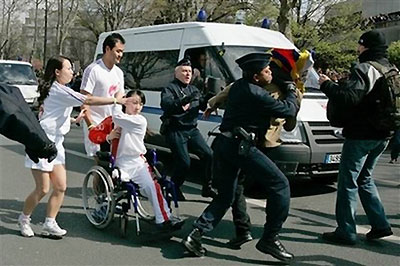The French ambassador to China has said he would like to meet the disabled Chinese torchbearer who was attacked in Paris during the Olympic torch relay to express his regret over the disruption.
 Torchbearer Jin Jing (in wheelchair), a Chinese Para-Olympic athlete, protects the torch to resist protestors' disruptions as she runs along the Seine River in the Beijing Olympic torch relay in Paris, April 7, 2008. [sohu.com]
Torchbearer Jin Jing (in wheelchair), a Chinese Para-Olympic athlete, protects the torch to resist protestors' disruptions as she runs along the Seine River in the Beijing Olympic torch relay in Paris, April 7, 2008. [sohu.com] |
"I deeply regret what happened during the torch relay in Paris," Herve Ladsous told a press conference on Friday.
He said he also felt hurt when he saw Jin Jing, a Paralympic athlete in a wheelchair, being attacked by violent Tibetan separatists.

"I hope I can meet Jin Jing in person to show friendship and my deep regret," Ladsous said.
The 27-year-old from Shanghai became a household name in China for protecting the torch while separatists tried to wrestle it away during the Paris leg of the relay on April 7. She has been dubbed the "Smiling angel in the wheelchair".
As well as hailing her courage, Chinese have expressed outrage at the attack, which they believe was made possible with the connivance of the French authorities.
Minutes before the Paris relay began, Tibetan "independence" flags were unfurled at the City Hall.
"The mayor of Paris (Bertrand Delanoe) should take responsibility," Ladsous said.
"One thing is clear: Similar incidents didn't take place in central government institutions," he said.
Paris police detained the person who attacked Jin Jing, he said.
He also said that French President Nicholas Sarkozy has not said he will boycott the Beijing Olympics.
"He just said it hasn't been decided whether he will attend the opening ceremony There are many possibilities, and we hope it will move in a good direction," Ladsous said.
The disruption of the Olympic torch relay in Paris and the comments by some French politicians about how the Chinese government handled the recent riots in Tibet have sparked widespread anger at France among Chinese Internet users and the public.
They have called on consumers to boycott French exports and to stop shopping at French retail giant Carrefour, which they say supports Tibetan independence groups, an accusation the company denies.
Ladsous said his government will "grasp every opportunity to show the spirit of cooperation" in solving the problems facing bilateral relations.
Despite the ambassador's friendly remarks, the dent the Paris disruption has made on Chinese attitudes toward France is deep.
Two Chinese artists have pulled out of an exhibition in France, local media reported on Friday.
Wang Guangyi and Lu Hao, two of the biggest names in China's contemporary art scene, said they will not take part in a June exhibition at a Paris gallery because of French attitudes toward the Olympics.
The support of some in France to boycott the August Games "made me feel very annoyed, so we thought that at this particular time attending the exhibition would be unhappy and decided not to go", the Beijing News quoted Wang as saying.
In Beijing, Qiang Ming, a graduate student at Renmin University of China, said what happened in Paris has changed his view of France.
He is one of the millions of educated young Chinese who started rethinking about Western values after the mess in Paris.
"I was shocked by the rudeness of many locals in Paris," Qiang said.
"In my opinion, a boycott against a French retailer is more rational than the collective hysteria of the French media toward China," he said.
Agencies contributed to the story